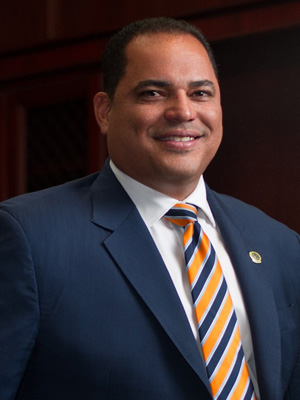2017-06
Resolution Urging Congress and the Executive Branch to Address Puerto Rico's Medicaid Cliff

SENATOR CARMELO RÍOS (PR) HEALTH CARE TASKFORCE
WHEREAS, Puerto Rico is currently facing its worst economic and fiscal crisis in decades, which presents an arduous challenge to the Government’s institutional responsibility, as parens patriae, of ensuring a good quality of life for its people.
WHEREAS, there are chronic illnesses that disproportionately affect Puerto Ricans, such as hypertension, Alzheimer, dementia, osteoporosis and ischemic heart disease. For example, there is an 18.2% more chance of a Puerto Rican getting diabetes than the average US-mainland citizen, while the probability of developing some types of cancer can increase by 20% in comparison with fellow citizens in the mainland.
WHEREAS, when the Patient Protection and Affordable Care Act was implemented in 2011, Puerto Rico was assigned a block grant of $6.4 billion that was expected to last until 2019; however, only $1.4 billion of these funds remain available in 2017.
WHEREAS, the Patient Protection and Affordable Care Act imposed on Puerto Rico’s government almost all of the responsibilities and requirements that were imposed on states, but only extended part or none of the funding needed to cover said costs. Complying with these requirements carried costs that exceeded the amount of funds provided to Puerto Rico, hence causing an early depletion of Medicaid funds today.
WHEREAS, even after paying the same amount of FICA taxes as citizens in the mainland, Puerto Ricans receive unequal benefits for healthcare;
WHEREAS, even if the $1.4 billion are extended until next December or January, a gap would be left until June 2019, which would have to be covered by the Government’s limited General Budget, estimated to run out by September if precautionary measures are not implemented.
WHEREAS, if Puerto Rico’s unequal treatment in the disbursement of federal funds continues, it would result in a humanitarian crisis. Currently, the federal Medicaid matching rate for Puerto Rico is statutorily set at 55%,
WHEREAS, eligibility under Federal Poverty Level for American citizens in Puerto Rico is 50% of the income needed to qualify for any other citizen in the United States,
WHEREAS, the absence of any additional federal funding would put the lives of 1.5 million American citizens in Puerto Rico, who benefit from the Government Health Plan, at risk.
WHEREAS, the average monthly payment of Medicaid per person in the United States is $569, yet in Puerto Rico the average Medicaid monthly payment per person is $167. Average monthly payments per person under Medicare differ as well; payments in any other United States jurisdiction average $826, while in Puerto Rico payments average $473.
WHEREAS, in the report made to the 114th Congress in December 20, 2016, the Congressional Task Force on Economic Growth in Puerto Rico, stated that the future financing of the Medicaid program in Puerto Rico is a serious and urgent issue facing federal policymakers attempting to address the territory’s economic and social challenges. Task Force members agreed that an equitable and sustainable legislative solution to the financing of Puerto Rico’s Medicaid program should be enacted early in 2017.
WHEREAS, Puerto Rico’s federal Medicaid funding (FMAP) is subject to an annual cap pursuant to Section 1108 of the Social Security Act (42 U.S.C. 1308), once the annual federal funding cap is reached, the territory’s government is responsible for the remaining cost of all Medicaid services. FMAP rates for Puerto Rico and other territories are not based on per capita income but, rather, are established by federal statute. According to the Congressional Research Service, if based on per capita income, Puerto Rico’s FMAP rate would likely be 83%, the maximum rate allowable under current Medicaid law.
WHEREAS, the Task Force recommends that, going forward, federal financing of the Medicaid programs in Puerto Rico and the other territories should be more closely tied to the size and needs of the territory’s low-income population.
THEREFORE BE IT RESOLVED, that the National Hispanic Caucus of State Legislators (NHCSL) calls for the federal government to provide additional funding in order to cover the fiscal cliff that Puerto Rico’s Medicaid program will likely experience on or before January 2018, due to the depletion of the remaining $1.4 billion from the funds provided by the Patient Protection and Affordable Care Act.
BE IT FURTHER RESOLVED, that NHSCL supports the elimination of the federal cap on Medicaid funding to Puerto Rico, as well as the implementation of the formula, based on per capita income, to determine Puerto Rico’s federal medical assistance percentage (FMAP).
BE IT FURTHER RESOLVED, that NHSCL recommends the federal government increases the federal share for Puerto Rico’s Medicaid program from 55% to 83%, as proposed by the Department of Health and Human Services.
BE IT FURTHER RESOLVED, NHSCL recommends the expansion of eligibility to 100% of the federal poverty level, expanding eligibility to anyone in Puerto Rico who is earning less than 100% of the Federal Poverty Level.
BE IT FURTHER RESOLVED, that NHSCL recommends the federal government adopts all of the recommendations made by the Congressional Task Force on Economic Growth in Puerto Rico, pertaining Puerto Rico’s Medicare program deficiencies.
BE IT FINALLY RESOLVED, that a copy of this resolution be transmitted to the President of the United States, the Vice President of the United States, members of the United States House of Representatives and the United States Senate, and other federal and state government officials as appropriate.
THIS RESOLUTION WAS ADOPTED ON APRIL 30, 2017, AT THE NHCSL EXECUTIVE COMMITTEE MEETING HELD IN WASHINGTON, DC.
